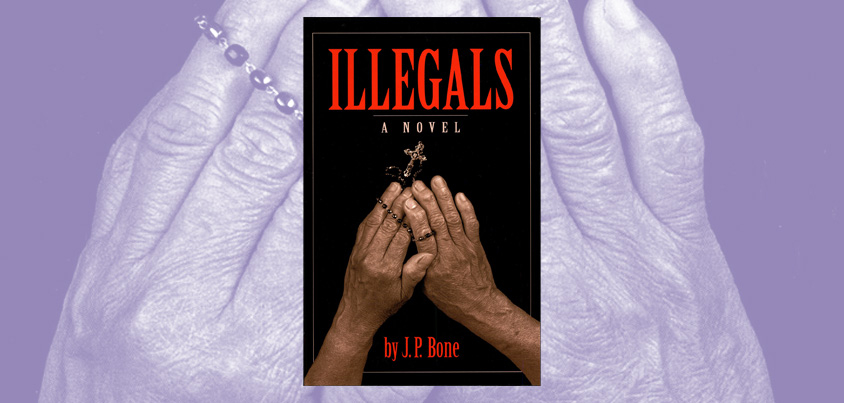Illegals the Novel Where to Find It
For more information about ILLEGALS, including blurbs by Michael Moore, Carlos Munoz, Jr. and Howard Zinn, go to : www.illegalsthebook.com

Illegals, by J.P. Bone, 2014 by Mindfield Publication, 291 pages.
Have you ever tried to counter racist attacks with facts and reasoned arguments? Yeah, it never works for me, either.
That’s because racism isn’t rational—it’s emotional. When politicians and their media mouthpieces blame immigrants for crime, low wages, and unemployment, they’re casting the newcomers as a faceless crowd, stirring up feelings of fear, jealousy, and hatred.
To win people’s minds, you have to touch their hearts… which is why J.P. Bone’s novel Illegals comes at the right time. Bone paints a humane portrait of immigrants with relatable hopes, dreams, and problems at work.
The story revolves around Rosa, an undocumented Latina woman who works in a shoe factory in East L.A.; Antonio, the labor rep organizing the factory; and several other factory workers and their families. Rosa’s husband has disappeared while visiting his dying mother in Mexico, and she’s struggling to put food on the table for her four young children.
Bone brings Rosa to life with poignant images. Out shopping one day with her children in tow, she puts some tomatoes on a vendor’s scale, sees the weight, estimates her meager cash on hand and the cost of the bus trip home—and puts one tomato back. Moments later an immigration patrol roars into the marketplace and Rosa flees with her children, leaving “the tomatoes on the scale, red and shining and ripe.”
A short time later, union organizer Antonio shows up at Rosa’s apartment. He has been struggling to convince enough workers at the factory to sign pledge cards. Rosa invites Antonio in, and the organizer notices her poverty and pride. She reminds him of his mother. But she doesn’t join the union, since the boss has threatened to call immigration on anyone who signs a union card.
Meanwhile in El Salvador, Manuel and Ana are starting a harrowing journey to cross the border into the U.S., where they hope to reunite with one of the factory workers.

Give $10 a month or more and get our "Fight the Boss, Build the Union" T-shirt.
The author’s personal experiences lend credibility to his telling of these stories. Bone was a volunteer organizer for the United Farm Workers in California in the mid-1970s. He later worked as a community organizer with undocumented workers in L.A. And for 36 years he’s been happily married to a woman who left El Salvador during the Civil War; they have two adult children and a young granddaughter.
In his novel, Bone contrasts the immigrant workers with the family that owns the factory. While Rosa is struggling to provide beans, rice, and enchiladas for her children, the Mersolas dine at a fancy table with servants and mountains of food.
The eldest Mersola son hires goons to break up a union demonstration. Then immigration agents raid the factory. Many workers are arrested, and nearly get deported—but just as their transport reaches the Mexican border, the bus turns around. Antonio and a coalition of religious activists and progressive lawyers have won an injunction to stop the deportation.
But this union drive isn’t out of the woods yet. Next the president of the shoe workers local tries to sabotage it. He doesn’t want undocumented workers in the union, because he fears they’ll vote for Antonio on a reform slate, dumping him and his high-paid officers. This new wrinkle puts the vote in jeopardy.
Some readers may not like Bone’s portrayal of a corrupt local union leader, but to call it anti-union would be to miss the point. When entrenched leaders get spoiled with high salaries and perks, it’s up to activists to fight their own union leaders as well as the bosses who exploit them.
Bone’s protagonists reject sellout deals. They insist that union leaders should be faithful to the cause and humble in personal rewards. In short, they demand the best from their labor movement. This novel challenges us to do the same.
Timothy Sheard is the editor of Hard Ball Press.
For more information about ILLEGALS, including blurbs by Michael Moore, Carlos Munoz, Jr. and Howard Zinn, go to : www.illegalsthebook.com